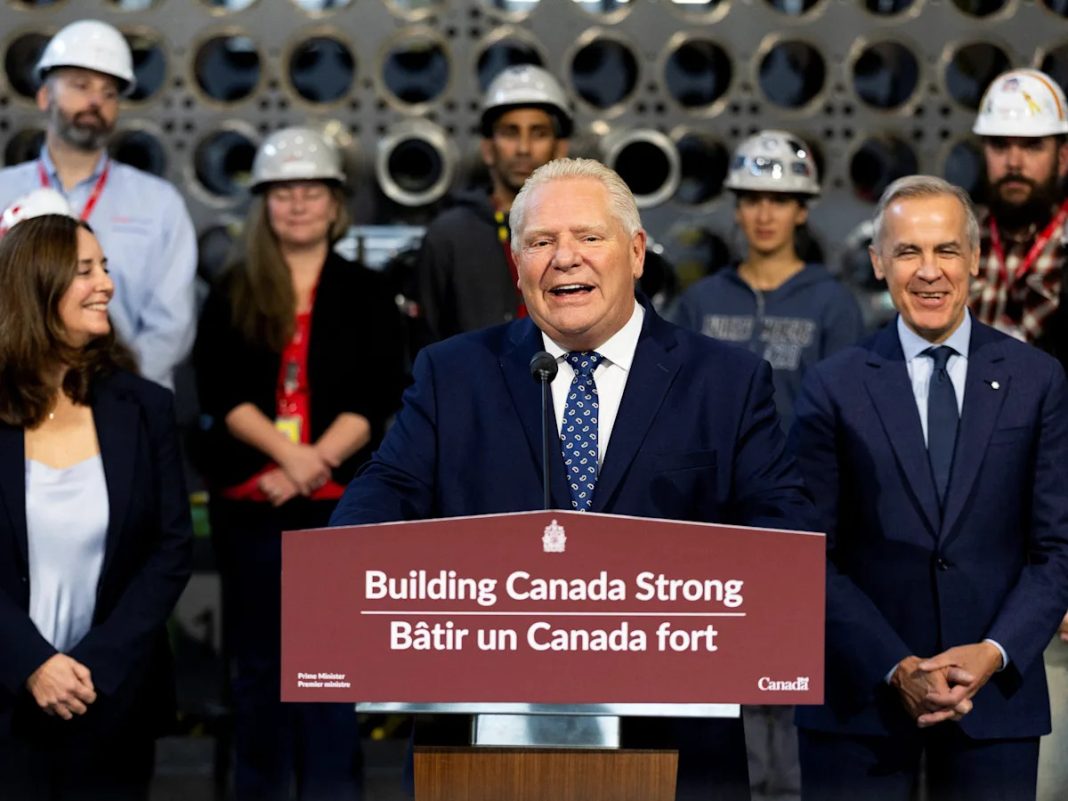-
Doug Ford is not apologetic for sponsoring an anti-tariff ad that aired twice during the World Series.
-
Trump put trade talks on ice over the ad, which features an excerpt from Reagan’s 1987 speech on tariffs.
-
Canada is working quickly to diversify its export destination by courting Asian countries.
Ontario Premier Doug Ford is not sorry that he aired an anti-tariff ad that derailed Canada’s trade talks with President Donald Trump.
The government of Ontario released an ad on US networks that features an excerpt from former US President Ronald Reagan’s 1987 “Radio Address to the Nation on Free and Fair Trade,” in which he discussed the dangers of tariffs.
The ad drew Trump’s ire, and the president posted on social media that he was terminating all trade talks with Canada. The Ontario politician later said it would pull the ad, but only after it airs twice over the weekend at the World Series.
“We have achieved our goal, to make sure that conversation starts with the American people, and with their elected officials, and my goodness, it’s started all right,” Ford told reporters at the province’s legislature in Toronto on Monday. “The best ad that ever ran, I’ll tell you.”
Trump had called the Reagan ad “fake” and said that he would not be meeting with Mark Carney, the Prime Minister of Canada, “for a while.” Some sentences in the ad are edited so they are not in the exact same order as Reagan delivered them, and the ad did not play the entire five-minute-long speech, but Reagan did explicitly detail the negative effects of tariffs in the context of explaining why he had to use them on Japan as a last resort.
Canada is reducing its reliance on the US
Canada is the US’s second-largest trading partner. The US’s neighbor to the north is already facing tariffs of 35% on its goods not covered by the USMCA, as well as a 50% tariff on steel exports to the US. After the Reagan ad aired, Trump said that an additional 10% tariff on Canada would be added.
Canada’s economy remains afloat despite Trump’s tariffs, and the country has been diversifying trade partners.
Canada has been actively pursuing trade ties in Asia. In September, Canada signed a trade deal with Indonesia, allowing it to export up to 95% of its goods there without duty within the next year. This is Canada’s first bilateral trade deal with an ASEAN country.
The deal was quickly followed by an in-person visit from Carney earlier in October, during which the prime minister discussed the importance of “reliable partners who honour their commitments” with 11 ASEAN leaders. Simultaneously, Canadian Foreign Minister Anita Anand toured cities in India, Singapore, and China to discuss boosting trade and investment with her counterparts.
“I am announcing an ambitious goal for Canada to double our non-US exports in the next decade,” said Carney during an October 22 speech at the University of Ottawa to outline his budget ahead of its release. “This will generate $300 billion more in trade — and new orders for Canadian resources, technologies, and expertise.”
While Canada’s economy contracted by 1.6% (annualized) in Q2, largely due to weaker exports to the United States, analysts at the Royal Bank of Canada expect modest but positive GDP growth in Q3, supported by early signs of stabilization in trade and manufacturing activity that began in July. According to Canada’s Q2 trade and economics report, exports to non-US destinations rose 14.7% compared to a year prior, partially offsetting the decline in shipments to the US.
Dan Nolan, co-owner of Tommy’s Speakeatery in Saskatchewan, Canada, told Business Insider that his business has “never been busier.” Nolan had told BI earlier this year that he is eliminating as many American imports as possible from his supply chain in protest of Trump’s trade policies.
“I’m not surprised at the latest ‘development,'” said Nolan of Trump’s decision to put trade talks on ice. “Since we last spoke, we recrafted our cocktail menu to not use any American whiskies and changed what items we could to non-American sources.”
“We are having a banner year. Our guests enjoy our local, made-from-scratch, fresh food, craft cocktails, and Saskatchewan craft beer,” Nolan added. “After Canada, our number two and three countries of origin are Ireland and Thailand.”
Read the original article on Business Insider

